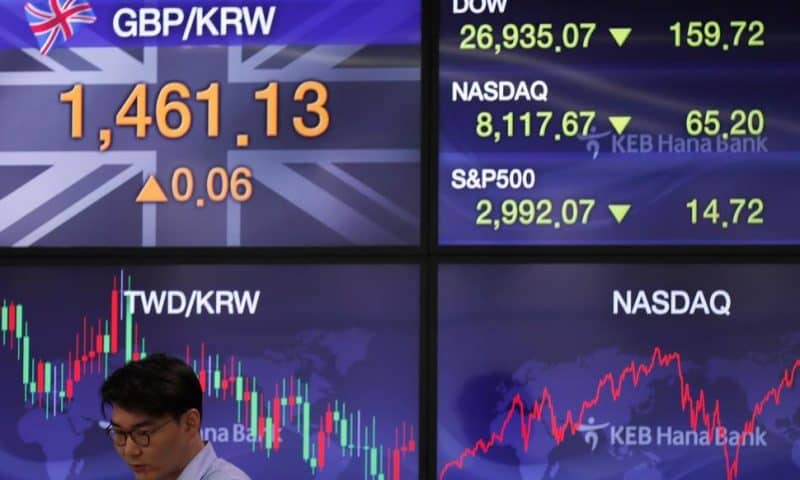A listless day on Wall Street ended Monday with major indexes closing little changed as modest gains from earlier in the afternoon faded in the final minutes of trading.
A listless day on Wall Street ended Monday with major indexes closing little changed as modest gains from earlier in the afternoon faded in the final minutes of trading.
The S&P 500 index slipped less than 0.1%, while the Nasdaq inched 0.1% lower. The Dow Jones Industrial Average notched a 0.1% gain. The stock indexes spent most of the afternoon holding on to slight gains following a wobbly morning in the market as investors digested some weak economic figures out of Germany.
Losses in the health care, communication services and industrial sectors outweighed gains in technology stocks, consumer-centric companies and banks. Bond yields declined, a sign that investors were seeking to avoid some risk.
Even so, Monday was a relatively quiet day for stocks after last week, when the Federal Reserve lowered interest rates again and fresh jitters over the next round of negotiations in the trade conflict between the U.S. and China helped give the S&P 500 its first week of losses following three straight gains.
“It’s a bit of calm after the storm,” said Craig Birk, chief investment officer at Personal Capital. “Last week there was a lot going on with geopolitical events and trade developments and central banks. This week, so far, there’s nothing so dramatic.”
The S&P 500 inched 0.29 points lower, or less than 0.1%, to 2,991.78. The Dow gained 14.92 points, or 0.1%, to 26,949.99. The Nasdaq fell 5.21 points, or 0.1%, to 8,112.46. The Russell 2000 index of smaller companies lost 1.52 points, or 0.1%, to 1,558.25.
The major indexes are each up modestly for the month and the quarter. The benchmark S&P 500 index remains close to its all-time high set in late July.
Bond prices rose, pulling down the yield on 10-year Treasury notes to 1.72% from 1.75% late Friday.
Markets have rallied this month as investors welcomed steps by Washington and Beijing to ease tensions in advance of their next round of talks next month. That’s fueled speculation among investors that the two countries may at least reach an interim deal on trade.
But prospects for a trade war resolution appeared to cool once again late last week following comments by President Donald Trump that he doesn’t necessarily need to make a deal before the next U.S. elections in 2020. Chinese officials canceled a planned trip to farms in Montana and Nebraska, an action that raised concerns of yet another halt in trade negotiations.
The Fed cut interest rates for the second time this year last week in another bid to shore up economic growth amid the lingering trade war and weak economic growth overseas. The central bank left open the possibility of additional rate cuts if the economy weakens.
Several companies could provide a clearer picture this week of the impact that the costly trade dispute is having on their business.
Nike, which could be a gauge of the trade war’s effect on shoemakers and retailers, will report fiscal first quarter results on Tuesday. Technology company Micron will report its fiscal fourth quarter results on Thursday.
“This quarter will be somewhat interesting in that tariffs have been around for a while now and the whole trade conflict is almost two years old,” Birk said. “We’ll start to see more this quarter if tariffs are truly having an impact, how well companies are able to navigate that or how much it’s just an excuse.”
Meanwhile, oil prices and the energy sector could experience more volatility this week as Trump takes seeks a coalition to confront Iran, which the U.S. blames for last week’s strike on a Saudi Arabian oil facility.
Health care stocks were the biggest laggards Monday. UnitedHealth Group slid 1.8% and Medical supply company McKesson dropped 2.6%.
Netflix was among the big decliners in the communication services sector. The stock fell 1.8%.
Chipmakers were big winners in tech stocks. Nvidia rose 1.2% and Qualcomm gained 1%. Traders also bid up shares in several retailers and restaurant chains. Target climbed 2% and McDonald’s rose 1%.
Utilities showed small gains. Investors typically shift to that sector and bonds when they are seeking safer places to put their money amid worries about economic growth.
E-commerce company Overstock.com slumped 25.3% after the company cut its financial forecast partly because tariffs have increased the costs of goods from China. It also named Jonathan Johnson as its new CEO. He has been acting CEO since August when Patrick Byrne resigned.
Benchmark crude oil rose 55 cents to settle at $58.64 a barrel. Brent crude oil, the international standard, gained 49 cents to close at $64.77 a barrel. Wholesale gasoline was unchanged at $1.68 per gallon. Heating oil climbed 1 cent to $2.00 per gallon. Natural gas was unchanged at $2.53 per 1,000 cubic feet.
Gold rose $16.40 to $1,523.70 per ounce, silver rose 86 cents to $18.60 per ounce and copper was unchanged at $2.59 per pound.
The dollar fell to 107.45 Japanese yen from 107.67 yen on Friday. The euro strengthened to $1.0995 from $1.1015.
Major stock indexes in Europe closed broadly lower as a gauge of Germany’s private sector activity contracted for the first time in nearly seven years, according to IHS Markit.
Germany is Europe’s largest economy and often acts as an indicator for the continent’s overall economic health. The latest data adds to worries that Europe is facing a slowdown. The European Central Bank is urging governments to spend more on stimulus as economic growth stalls.

